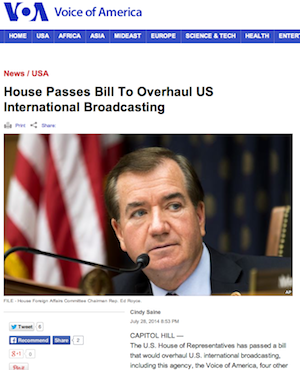
View of the Capitol Building from the roof of the Voice of America on 330 Independence Ave., S.W.
The United States International Communications Reform Act of 2014 (H.R. 4490) has just passed the the House today, next it will go before the US Senate.
This bill proposes major changes to the overall structure of US international broadcasting. Click here to read previous posts about the bill and read the press release below for more information.
We will update the SWLing Post with news about H.R.4490 as it is presented before the Senate–follow the tag HR4490.
(Source: House Committee On Foreign Affairs)
Washington, D.C. – Today, Rep. Ed Royce (R-CA), Chairman of the House Foreign Affairs Committee, applauded House passage of bipartisan reform legislation to improve the missions, objectives, and effectiveness of U.S. international broadcasters, such as the Voice of America (VOA), Radio Free Europe-Radio Liberty (RFE/RL), Radio Free Asia (RFA), and the Middle East Broadcasting Network (MBN). The legislation, the United States International Communications Reform Act of 2014 (H.R. 4490) was unanimously passed by the Foreign Affairs Committee in April. Chairman Royce and Rep. Eliot Engel (D-NY), the Committee’s Ranking Memberintroduced the legislation in April.
On House passage of H.R. 4490, Chairman Royce said: “For many years, our international broadcasting has been broken and ineffective. While strongmen, despots, and terrorists are working overtime on their public disinformation campaigns, the U.S. Broadcasting Board of Governors, which oversees our international broadcast efforts, meets once a month. The status quo is a recipe for failure on the critical information front. The legislation the House passed today provides serious reforms to U.S. international broadcasting, allowing for a strong, effective tool in the fight against censorship and harmful misinformation.”
H.R. 4490 reforms U.S. international broadcasting, including in the following ways:
Fixes Well-documented Management Problems — Currently, five U.S. international broadcasting entities report to the Broadcasting Board of Governors (“BBG”), a group of 9 part-time individuals, who meet once a month to make management decisions. Important decisions can languish if the Board does not have a quorum, which is often the case. This legislation would establish a full-time, day-to-day agency head and reduce the role of the Board to a more appropriate advisory capacity. These changes have been recommended by the State Department’s Office of the Inspector General and are widely recognized as needed reforms.
Clarifies the Mission of the Voice of America (VOA) — The VOA charter states that VOA will provide a “clear and effective presentation of the policies of the United States.” Over time, VOA has abandoned this mission and adopted a mission of the so-called “surrogates” to provide uncensored local news and information to people in closed societies. This legislation makes clear that the Voice of America mission is to support U.S. public diplomacy efforts.
Consolidates “the Freedom Broadcasters” — Radio Free Europe-Radio Liberty (RFE/RL), Radio Free Asia (RFA), and the Middle East Broadcasting Network (MBN) have the same mission – to provide uncensored local news and information to people in closed societies – with different geographic reach. Consolidating these organizations into a single, non-federal organization will achieve cost savings, allow for closer collaboration, and improve responsiveness. While the consolidation would mean shared administrative staff and other economies of scale, they would retain their distinct “brand names.”
For information of Chairman Royce’s efforts to reform international broadcasting, visit www.foreignaffairs.house.gov/broadcasting.







